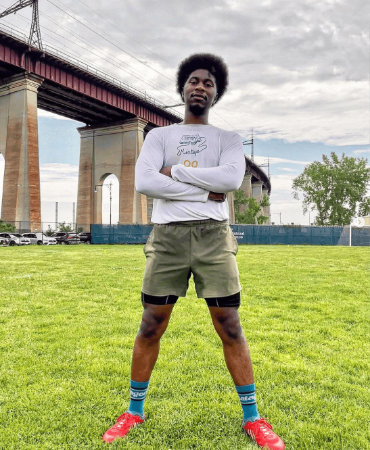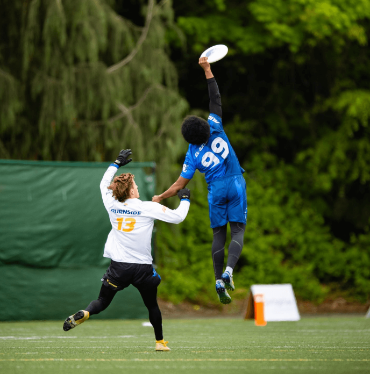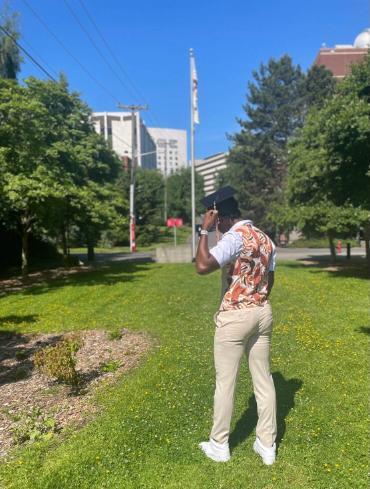6 Ways an MBA Prepared First-Gen Student Khalif El-Salaam to Take on Today’s Competitive Job Market
/234x0:1927x1080/prod01/channel_34/media/seattle-university/albers-school-of-business/news-and-events/albers-news/pov-blog/Khalif-El-Salaam-banner.jpg)
'Albers was, without a doubt, the best route to gaining the competitive advantage,' said this first-gen student, 5x USA ultimate frisbee champion, and 2022 World Games gold medalist.
When faced with difficult economic times—complete with a competitive job landscape—do you shrink, or do you rise to meet the challenge?
For those who know Khalif El-Salaam, it’s no surprise he took the leap. A first-generation college student, 5x USA ultimate frisbee champion, 2022 World Games gold medalist, and experienced marketing and project management professional, he has always faced hurdles head-on—whether in the office or on the field.
One of many faced with layoffs during the onset of the COVID-19 pandemic, this time was no different. Khalif needed to broaden his tool belt if he wanted to be successful in an increasingly difficult job market.
The key? A quality MBA education from a robust program—and he knew Seattle University was just the place. “Albers was, without a doubt, the best route to gaining the competitive advantage. It’s a tough program, and I wanted the challenge. I want my degree to mean something.”
Learn how Khalif leveraged a career roadblock into an opportunity for growth by earning an MBA with a specialization in marketing management at Albers.
#1: Letting His MBA Coursework Surprise Him
As an athlete, Khalif knows success comes from the combination of strategy, hard work, discipline, best-in-class training, and a supportive community, and that’s what he found at the Albers School of Business and Economics.
Khalif’s coursework brought surprising learning opportunities, too, including a better understanding of hard and soft skills, emotional intelligence, career development, and networking.
At Albers, there’s also an emphasis on educating the whole person. This aligned well with Khalif’s people-first approach to business. “I want to humanize the work process,” he says. “When I go into an early meeting, I ask my team whether or not they’ve eaten breakfast. And if they haven’t, we all grab a snack and eat together while we tackle our agenda. The best work is done when you can collaborate on an interpersonal level.”
With this value at his core, Khalif took away valuable insights from lessons in empathy and emotional intelligence throughout his coursework. In particular, Khalif emphasizes the impact his Women in Leadership class had on him.
“I want to better understand the experiences of others on my team, so it’s important for me to know what women experience in the workforce,” says Khalif. “Learning about existing biases, social expectations, and professional barriers—these stories stuck with me. As a minority myself, it could be easy to focus only on the ways I’ve been disadvantaged. By opening my eyes to the experience of other minorities—especially women in business—I’m able to create a deeper level of empathy and self-awareness. This helps me better understand and connect with my colleagues.”
#2: Tracing Connections Between Ultimate Frisbee and Project Management
Empathy and emotional intelligence are some of the many connections he has found between leadership in business and in athletics. “When I’m on a team, I make sure to bring humor, good vibes, and care for my coworkers,” says Khalif. “That’s what makes people want to work with me—whether on the field or in the workplace. I’m committed to making people feel seen and valued as whole humans.”
In business, a four-week tech sprint isn’t much different from working towards a championship win in ultimate frisbee. “In both, I ask myself: Who’s involved? What are the tasks? The timelines? And: How can we get the best version of each team member?”
To grow his project management skills, Khalif wanted to gain a more comprehensive understanding of what goes into running a business. To him, understanding different roles on a business team is important to achieving success—much like it is in athletics.
“I want to know what processes exist so that I can better support others on my team,” he says. “I might not need to implement every process, but I want to know it exists and understand how it’s used so I can have the full picture.”
#3: Learning the Value of Networking (Or, That It’s OK to Ask for Help)
One of Khalif’s required courses at Albers centered on career development, helping students to develop a concrete, actionable understanding of networking. “I felt awkward about networking when I came to Albers, but I slowly became more comfortable asking classmates and colleagues for help,” says Khalif. “I realized people are more likely to help you than not—and if they can’t help, they won’t judge you for asking. After all, wouldn’t I be quick to support someone who reached out to me?”
Today, he’s become more confident about growing his network and connecting with others in his field—an essential practice whether you’re on the job market or continuing to grow your career.
 #4: Gaining Tangible Real-World Experience in the Classroom
#4: Gaining Tangible Real-World Experience in the Classroom
For many MBA students, it’s a learning curve to translate classroom experiences to the workforce. Not so at Albers. “Albers took the real world and put it right in front of us,” says Khalif. “We’re not just reading an article and discussing it; we’re hands-on, looking at real business processes.”
He emphasizes how tangible his learning experience was in his MBA coursework, making tough concepts easier to understand and apply.
#5: Customizing His Education Track to Fit His Career Goals
One of many things Khalif valued throughout his Albers education was the ability to customize his course of study. “I was able to specialize and take courses most relevant to my career. Other MBA programs required more core courses that wouldn’t have been as relevant to me.”
Khalif also stresses the rigor of the program. “The coursework was difficult–and it should be,” says Khalif. “When I say I come from Seattle University, I want others to know that means hard work. I wanted to understand the full circle of a business, from start to finish. And I enjoyed the challenge.”
For Khalif, the effort will pay off–not just for himself, but for his future employer. “I wanted a degree that reflects my increase in knowledge and ability to add value to my future teams. I know that when I go into my next role, I’ll be prepared for almost anything.”
#6: Learning to Negotiate and Advocate for Himself
According to a study from the Journal of Applied Psychology, first-generation college students are less likely to negotiate their salaries and more likely to accept positions for which they are overqualified. Albers seeks to combat these discrepancies by giving MBA students hands-on experience with negotiation.
“I didn’t know how to ask for something that wasn’t offered to me. And as with anything, if you don’t practice, you won’t be great at it,” he says.
In one class, Khalif and his cohort gained hands-on negotiation practice every week. “We were paired off and given a prompt. At the end, you would reveal what you wanted, and your partner would give you feedback: ‘When you said this, I was more likely to give this up’ or ‘When you said this, I pulled back.’”
Khalif found this experience to be empowering, giving him the tools and confidence to enter the job market. “I was able to greatly improve both my conflict management and negotiation skills,” he says, “and I know this will have a long-lasting impact on my career beyond the job search.”
“Do Everything with Purpose”
For others considering an MBA program, Khalif suggests coming in with a firm idea of what your goals are for the program. “Grad school is hard–especially if it’s a strong program like Albers, and especially if you’re still working. You don’t have time to dabble around,” he says. “Know what you want to specialize in, and give it everything you’ve got.”
Ultimately, Khalif credits Albers with preparing him to be ready for the job market. “The professors are phenomenal, and I had the ability to lean in and focus on my niche. This helped me go into the job search more prepared.”
His ultimate advice? “Do everything with purpose.” While Khalif is talking about the MBA, we have a feeling this is a larger motto he lives by.
What’s next for Khalif
A first-generation college student, Khalif is also the first in his family to achieve an advanced degree.
Now armed with his MBA and a certificate in Marketing from Albers, Khalif hit the job market running. He's now a Business Operations Consultant at Spur Reply.
Follow Khalif El-Salaam, '23 MBA, on LinkedIn.
Bryanna Tidmarsh
July 16, 2024